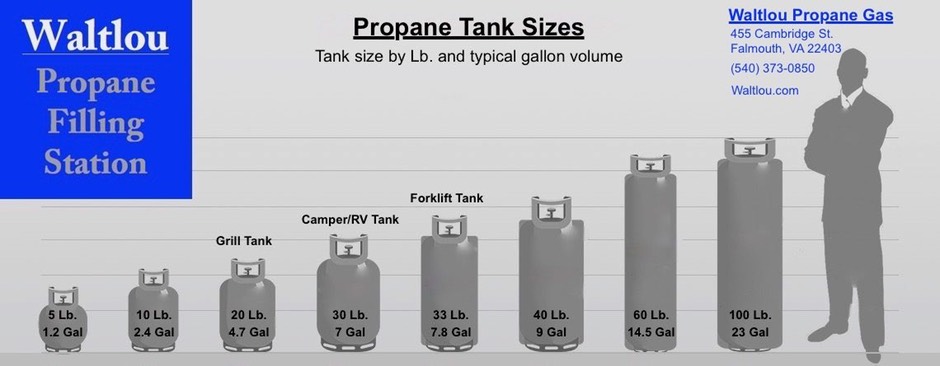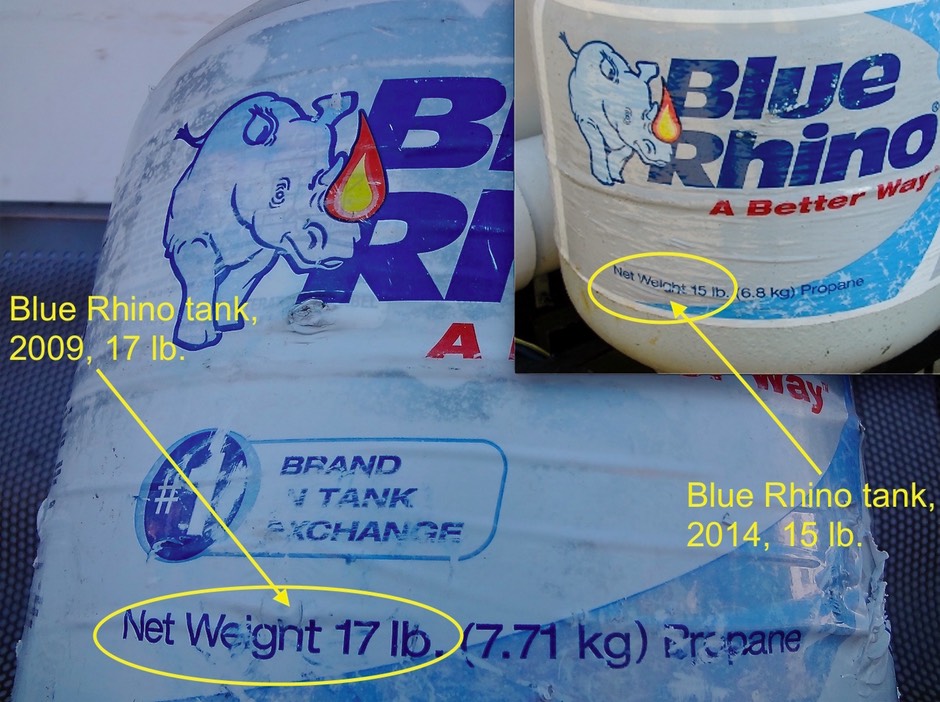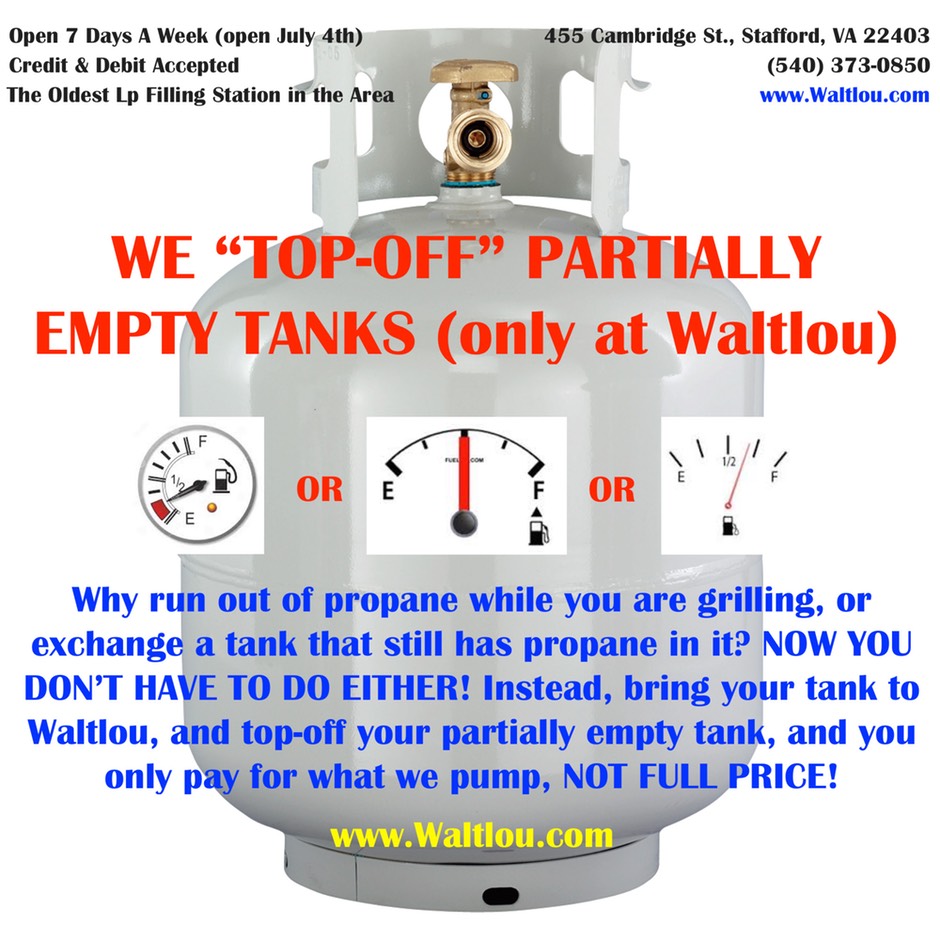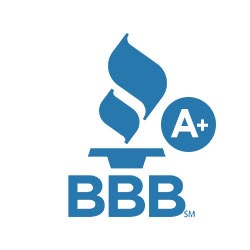Why overspend using a tank exchange? Instead, visit WALTLOU PROPANE and enjoy the lowest propane prices around 7 days a week.

455 Cambridge St., Fredericksburg, VA 22405
(540) 373-0850
Hours of Operation
Monday thru Friday: 8:00am to 6:00pm
Saturday: 9:00am to 5:00pm
Sunday: 9:00am to 5:00pm

As you can see, the tank exchanges dropped the amount of propane they pump into their tanks, again. But why are the newer tanks only filled with 15 lb. and the older tanks filled with 17 lb.?
The only difference is that they changed their label. The size and capacity of each tank is the same and has never changed. When you use a tank exchange, you are only getting 15 lb. (3.5 gallons) instead of 20 lb. (4.7 gallons). In this pic there are two 20 lb. tanks, which are designed to hold 20 lb. of propane. The tank exchanges dropped the amount of propane they pump into their tanks from 20 lb. down to 17 lb. Some years later they dropped again from 17 lb. down to 15 lb., where they are currently. You get 25% less propane, and pay almost twice the per gallon price using a tank exchange, for the convienience.
A common problem with tank exchanges is that the valves are damaged from use/abuse and the only way you can tell is by hooking the tank up. The tanks need to be purged and/or the valves changed in many cases. We see a lot of tanks come in where customers grills quit working or heating and the tank still has plenty of propane left. When you refill your own tank, you know that the tank is not abused and you keep it upright. OPD valves (overfill prevention device) have a float inside the tank. When tanks are dropped, thrown around or transported/storred on their sides, damage can happen to the float, which can effect output, refill and is very common with tanks from tank exchanges. Some take a bad tank to a tank exchange to get a better one, but many times those bad tank valves are not detected, and that tank goes back into rotation, and an unlucky person gets a tank that works poorly or not at all.
To sum it up, when you use a tank exchange, you pay far more, and gets 25% less propane. When using a tank exchange, you don’t know how a tank has been handled, and if the valve is in good working order.
At Waltlou Propane, we pump a full 20 lb. into your tank, which is 25% more compared to using a tank exchange. If your tank is not empty, we top-off your tank, and you only pay for what we pump.
Propane Facts:
Propane is a three-carbon alkane, normally a gas, but compressible to a liquid that is transportable. It is derived from other petroleum products during oil or natural gas processing. It is commonly used as a fuel for engines, barbecues, and home heating systems.
When sold as fuel, Propane is commonly known as liquefied petroleum gas (LPG or LP-gas) which can be a mixture of propane along with small amounts of propylene, butane, and btlene. The odorant ethanethiol is also added so that people can easily smell the gas in case of a leak. The increasing popularity of green fuel vehicles has increased the demand for LPG; in the US, nearly 200,000 transportation vehicles run on on LPG fuel. After diesel and gasoline, it's the third most popular fuel and the most popular "green fuel”.
PROPANE PROPERTIES:
Propane Is a Safe Fuel:
The propane industry has developed numerous methods to ensure the safe transport and use of propane:
• Propane equipment and appliances are manufactured to rigorous safety standards.
• Propane has a narrow range of flammability when compared with other petroleum products. In order to ignite, the propane-air mix must contain from 2.2 to 9.6 percent propane vapor. If the mixture contains less than 2.2 percent gas, it is too lean to burn. If it contains more than 9.6 percent, it is too rich to burn.
• Propane won’t ignite when combined with air unless the source of ignition reaches at least 940 degrees Fahrenheit. In contrast, gasoline will ignite when the source of ignition reaches only 430 to 500 degrees Fahrenheit.
• If liquid propane leaks, it doesn’t puddle but instead vaporizes and dissipates into the air.
• Because it is released from a pressured container as a vapor, propane can’t be ingested like gasoline or alcohol fuels.
• Because propane is virtually odorless and colorless in its natural state, a commercial odorant is added so propane can be detected if it leaks from its container.
Propane Is a Versatile Fuel:
• Propane is used by millions of people in many different settings — in the home, on the road, on the farm, and at work.
• More than 14 million families use propane to fuel their furnaces, water heaters, air conditioners, outdoor grills, fire places, dryers, and ranges.
• Millions choose this clean-burning fuel for bus, taxi, delivery, and other fleets to minimize air pollution in metropolitan areas.
• Propane is used on 865,000 U.S. farms for irrigation pumps, grain dryers, standby generators, and other farm equipment. It is an essential fuel for crop drying, flame cultivation, fruit ripening, space and water heating, and food refrigeration.
• Propane is easy to transport and can be used in areas beyond the natural gas mains. Because it is 270 times more compact as a liquid than as a gas, it is economical to store and transport as a liquid.
455 Cambridge St., Fredericksburg, VA 22405
(540) 373-0850
Hours of Operation
Monday thru Friday: 8:00am to 6:00pm
Saturday: 9:00am to 5:00pm
Sunday: 9:00am to 5:00pm
Propane Part Sales:
Regulators, POL Valves, Fittings, Hoses, Gages, and other items typically used for grills, heating, RV's, etc. Visit our office to view what we have in stock, or make special orders.
Propane Tank Sales:
20lb. Tanks
20lb. Tanks
40lb. Tanks
60lb. Tanks
100lb. Tanks
20lb. Forklift/ Buffer Tanks
30lb. Forklift Tanks
33lb. Forklift Tanks




